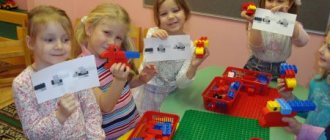Educational field: cognition, socialization. Integration of educational areas: communication, reading art. literature, the formation of a holistic picture of the world, music. Children's age: 5-7 years. Forms of direct educational activity: conversations, theatrical activities, games. Objectives: 1. Expand children's knowledge about their rights and responsibilities; Contribute to the development of a global worldview of legal ideas. 2. Develop the ability to reason, compare, and draw conclusions. 3. Foster feelings of self-esteem and respect for other people; To help children realize the need to have their own name, housing, the right to medical care, to education, to work; Dictionary of new words: convention, rights, obligation, state, generation, pedigree, orphans; Preliminary work: familiarization with the Convention on the Rights of the Child; reading fiction: Little Red Riding Hood, Zayushkina's hut, Aibolit, Phillipok, Cuckoo, poems, proverbs, sayings; creation of a family tree, a baby book on children's rights; Equipment and materials: multimedia equipment, tape recorder, cell phone, costumes of fairy-tale characters, illustrations for fairy tales, video and audio recordings. GCD progress: The teacher welcomes the children and guests of our group. Educator: Dear guys, our group has received a lot of letters by email, let’s see who they are from and what they are writing to us, maybe someone needs our help. The first letter from Little Red Riding Hood: Educator: Let's remember the fairy tale Little Red Riding Hood by C. Perrault.. What do you think is the problem of the hero of this fairy tale? What rights are violated? Children: Right to life. Educator: Guys, how do you think we can help Little Red Riding Hood? Children: Talk about the Convention on the Rights of the Child, about the right to life. Educator: Let's tell Little Red Riding Hood, her grandmother and the gray wolf about the right to life and a tolerant, tolerant attitude towards each other. After all, little red riding hood, grandmother and gray wolf can live peacefully and amicably in the forest. Oh, how friendly and peaceful people live in our republic, city, and even in our kindergarten. Educator: What nationalities do people live in our republic, city? Children: Russians, Tatars, Chuvashs, Mordovians... Educator: Yes, and there is enough space for everyone in our multinational country. Second letter from Phillip: (read with the children) Educator: Tell me, is this the hero of which fairy tale? Let's remember the work. Name the author. Children: Filipok's story was written by L. Tolstoy Educator: Tell me, where did Filipok hurry in the morning? Children: To school. Educator: Why didn’t his mother let him there? Children: He's small. Educator: What right do you think Phillipok took advantage of when he came to school? Children: The right to education. Educator: Children, when will you exercise this right? Children: When they turn 7 years old, all children go to school. Educator: You will soon use this right. At school you will receive a free education, which is guaranteed by the Convention on the Rights of the Child. Third letter: (read with the children) Come, doctor, to Africa quickly And save, doctor, Our kids... They have tonsillitis, Scarlet fever, cholera, Diphtheria, appendicitis, Malaria and bronchitis! Come quickly, Good Doctor Aibolit! Educator: Guys, what fairy tale hero wrote this letter? Children: From the fairy tale “Aibolit” by K. Chukovsky Educator: What problem do you think the animals faced in Africa? Children: The cubs are sick. Educator: Who helped them? Children: Good Doctor Aibolit. Educator: Where do people go if they are sick? Children: To the hospital, clinic, doctors. Educator: - what right do we use at this time? Children: For free medical treatment. Music pause: listening to an excerpt of the song “Men in White Coats” Educator: Oh, I received an SMS message on my phone. I'll read it now. Educator: This is a message from the children from the fairy tale “Cuckoo”, they are asking for help. Educator: Who remembers what happened in the family of these children? Children: In this fairy tale, mother turned into a cuckoo and flew away. Educator: Why? Children: The children treated her badly. Educator: Why are they so upset? Children: Because it’s bad without a mother. Educator: Yes, without mom, dad, grandparents, children feel very bad. Every person needs his family. It’s not without reason that they say that a man without a family is like a bird without wings. Educator: So you all also have a family. What is your family? Children: Strong, friendly, big, caring... Educator: Let's all come to our exhibition, where the family trees of your families are located, which you created with the help of your parents. Children's stories about their “roots”. A living letter is a fragment of the program “While Everyone is Home” about orphans. Educator: Guys, not everyone has fathers and mothers. There are families whose mother or father died, or some other misfortune happened. Now is peacetime, but there are many orphans in our orphanages. Educator: Who are orphans? Children: These are children who do not have parents. Educator: What do you think can be done to prevent orphans, unless it is an accident? Children: Girls learn to be good mothers, and boys learn to be good fathers. Educator: That's right, and then there will be no abandoned children, families will be strong, and the children in them will grow up happy. Educator: It's time for fun. Let's play now. What right will we exercise? Children: The right to rest. Educator: That's right, now we're going to play with you. The game "Allowed - prohibited." Educator: Hush, I hear someone crying, let's see who is grieving there, maybe we can help. Dramatization of the fairy tale “Zayushkina’s hut” (excerpt) Educator: Children, what right did the fox violate in relation to the bunny. Children: Right to inviolability of home. Educator: Who will tell the fox about this right? Children: Everyone has the right to housing, their own home. No one has the right to kick the owner out of his house if he pays for services on time and keeps it in order and clean. Educator: Well, all the letters are over. Why are you so satisfied and happy? Children: We helped many fairy-tale heroes achieve justice and resolved controversial issues. Telling children poems about rights. Educator: Well, that’s all, all the letters have been read, the problems have been solved. Let's live in love and harmony with ourselves and with the people who surround us. Singing V. Shainsky’s song “About Friendship”
Rating
( 2 ratings, average 5 out of 5 )
Did you like the article? Share with friends:
You may also be interested


